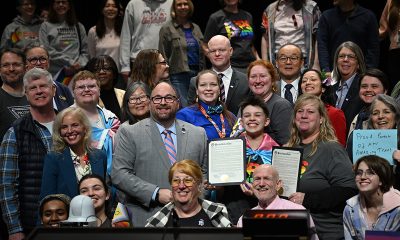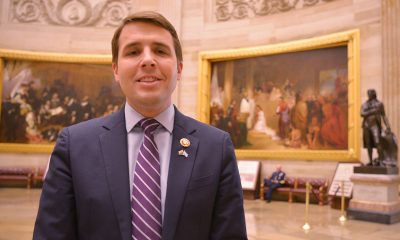a&e features
Getting to know new Washington Bach Consort conductor Dana Marsh
Organist/singer/conductor brings period music expertise to Washington ensemble
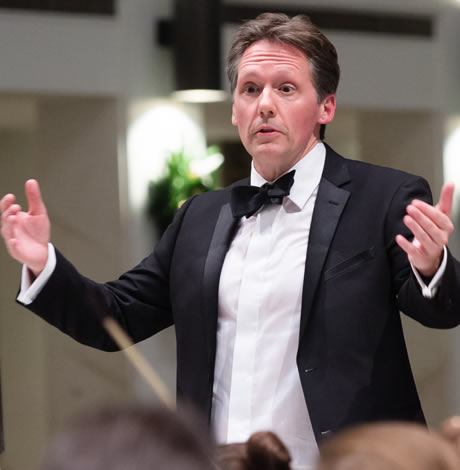
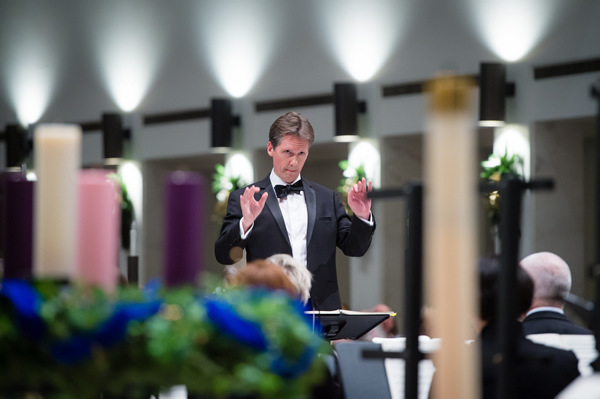
Dana Marsh says he developed an affinity for classical music at an early age. (Photo by David Betts; courtesy Metropolitan Photography)
To say the Washington Bach Consort was sent reeling with the June 2016 death of its founder J. Reilly Lewis is an understatement.
Lewis founded the Consort in 1977 dedicated to the music of Johann Sebastian Bach — arguably the most towering figure in the history of western music — and his contemporaries. Its board opted to use its 2017-2018 40th season as a lengthy audition process for a new artistic director. Dana Marsh, an Eastman-trained singer/conductor/organist, has secured the position and will open the 41st season on Sunday, Sept. 16 with “Handel & Bach: Sing a New Song” at National Presbyterian Church (4101 Nebraska Ave., N.W.; details at bachconsort.org).
Marsh received “very enthusiastic support” from Consort musicians, Charles Reifel, head of the group’s artistic committee and a Consort board member, said in a press release. “We feel very fortunate to have found him.”
He holds a master’s and doctoral degree in historical musicology from the University of Oxford and has been hailed by the Los Angeles Times as an “energetic and persuasive conductor” and dubbed a “powerful and expressive countertenor” by the New York Times. He taught early music history at Oxford and Cambridge universities.
Marsh, 53 and gay, is starting his fifth year as associate professor of music and director of the Historical Performance Institute at the Indiana University Jacobs School of Music. He’ll continue there and commute to Washington to lead the Consort. Marsh spoke to the Blade by phone last week from his Indiana office. His comments have been slightly edited for length.
WASHINGTON BLADE: It sounds like your work at the Historical Performance Institute will dovetail with the Consort’s mission. True?
DANA MARSH: Yes, there’s a great deal of overlap. What I do at Indiana University is considered historical performance where we use period instruments that are different from the versions used in modern orchestras that have been updated hugely. We try to do a bit of period drama and I direct at department at Indiana University that deals with that and the Washington Bach Consort also performs with period instruments.
BLADE: I was reading some liner notes recently that said something to the effect of what was actually likely heard in Bach’s churches at the time is not something we would find pleasant today. Is that true?
MARSH: There may be some truth to that speculation, that it would have sounded very out of tune to our ears. That could be the case but probably isn’t at least as far as the tuning goes. The performance practice itself, the way they made music and expressed text, some of that might have come as a shock to us, but when we start from the first temperament that we know of, they were very strict temperaments and they were probably more in tune than modern equal temperament because there weren’t as many key areas emphasized so it actually means it was very, very in tune.
BLADE: What is the appeal of period instrumentation for you?
MARSH: The idea of all this isn’t to tell people not to play Bach on modern instruments. There are lots of people who play on modern instruments who understand the detail and nuances (of early music) quite well. You can on modern instruments come extremely close to creating the same types of historical effects musically speaking that you can on earlier instruments. … One thing you certainly wouldn’t want to do is play lots of late 18th or 19th century music on tunings that were devised for the early 17th century. We’d think everyone was playing out of tune or incompetent. It has to fit the music it goes with.
BLADE: How did you develop an affinity for historically informed performance?
MARSH: I think it has to do with my really early musical training. Early on in life, when I was a choir boy both in New York and in England, first at the St. Thomas Choir School then at Salisbury Cathedral in England, a lot of the music (we performed) tended to be from the 15th and 16th centuries, so I felt a super strong affinity for those styles. I had a passion to find out in much more detail all I could about early music.
BLADE: Since you encountered it at a young age, is there a nostalgia factor for you with that music the way the Beatles and Motown and stuff like that has for the more general population?
MARSH: Yes, I would say so. I think whatever music we listen to, we tend to associate it with particular times in our lives, an experience, a smell or any sensory type of thing and you know, that automatically speaks to us from the inside in a certain way but there’s an intellectual fascination as well and that can be a great part of it too.
BLADE: Was your family musical?
MARSH: Yes, my dad was first violinist at the time for a well-known string quartet and he was on the road doing 50-60 concerts a year. My mom was an elementary school music teacher so there was no escape. … It was in my blood stream from a very early age.
BLADE: What’s life like in Bloomington, Indiana?
MARSH: Bloomington is an awesome town, right here in the middle of Indiana, this bastion of redness that’s very conservative but Bloomington has always been more liberal even going back to the 1950s. … It’s also aesthetically beautiful and there’s lots going on in the arts. There are over a thousand concerts a year associated with the school of music and seven operas done on a professional scale each year. It’s a surprisingly progressive and culturally rich town.
BLADE: How are you going to manage flying back and forth logistically?
MARSH: I checked into those concerns before I applied. The flights from Indiana to Reagan are incredibly efficient. I can leave my house by 6 a.m. and be on the Metro by 9:30. I’ll be in D.C. about half of September and more throughout the fall of course. Many of my colleagues have very full performing careers and are on the road so as long as one can shuffle everything around, the students and the school are totally behind it. It helps maintain their reputation.
BLADE: It sounds like a lot. Are you concerned you might spread yourself too thin?
MARSH: That’s always a possibility but for me things like that are sometimes almost counterintuitive. I find the more I’m in one situation, the more likely I am to get in a rut. If there’s something stimulating happening in the other situation, it helps me stay engaged (in my main work). It energizes me.
BLADE: What do you do at I.U.?
MARSH: I conduct and teach. I sort of have to wear a lot of hats from administrative functions to teaching to performance and then I also coach individual vocalists on performance style and conduct our early music ensembles. We have a bit of a rotation among faculty and with my administrative job, there are two entities. At the Historical Performance Institute is the musical research side of things and then the Historical Performance Department, which is the educational institute, that’s where the school of music deals with the students and faculty and everything that involves.
BLADE: I imagine you had been familiar with the Washington Bach Consort prior to hearing of the position?
MARSH: Absolutely. In fact, a few friends of mine who are professional singers had sung solos for Reilly in the past.
BLADE: Would you say the Consort has an international reputation?
MARSH: I would definitely say national, maybe not so much international and that’s one of the things we want to work on and will be an essential part of our new strategic plan.
BLADE: What is the Consort’s annual operating budget?
MARSH: I believe it’s about $1 million.
BLADE: Bach’s music is so heavily steeped in Christianity. Are you a Christian and do you feel Christians, people of other faiths and atheists can savor Bach equally or does his music tend to have added resonance for Christians?
MARSH: I was brought up in the church and Christianity though from a spiritual standpoint, I would say my horizons have broadened a bit and I would categorize my beliefs in that way now. There’s a lot of great art that came out of Christianity. When you think of all the people designing stained glass or building cathedrals, there had to have been skeptics among them and yet anyone can look at that art and be entirely struck by it. … I don’t think you have to be a believer to fully grasp what the composer means. … There are atheists who write about theology and are fascinated by it. … You can be an atheist and be absolutely struck by, say Bach’s “Mass in B Minor.”
BLADE: How religious does the elite classical music performance world tend to be in your experience?
MARSH: Certainly that community is well represented but I wouldn’t say it’s a majority. I would say it’s more like a long continuum and you have people whose beliefs would overlap with some of the places we perform like the National Cathedral or other outstanding church programs in the D.C. area, but also go exceptionally far beyond that as well.
BLADE: Is Bach really considered early music?
MARSH: The term early music has been something of a moving target. It used to be considered anything before 1750 with the emphasis on medieval and renaissance music but it kept moving forward and now it can be anything up to the end of the 19th century but it’s more about understanding the instruments they had at their disposal and how musical values have changed over time.
BLADE: When did you find out you got the job?
MARSH: I got the news in the middle of May but it wasn’t announced ’til August. I think the board wanted to get as much mileage out of the announcement as they could.
BLADE: What do you have planned for the opening concert?
MARSH: It will be very celebratory. We’re doing one of the Bach cantatas (BWV 190). The translation is “Sing Unto the Lord a New Song.” The second piece is by Handel and it’s his ode to St. Cecilia, the patron saint of musicians, a wonderfully rich piece. Then the final piece will be the Bach “Magnificat,” which is probably the best known of the three.
BLADE: How many singers and players are in the Consort?
MARSH: There are three formats: the subscription series at the National Presbyterian; the cantata series (six per year) at Church of the Epiphany and St Peter’s Capitol Hill; and the chamber series is held at the First Congregational FCC at 10th and G Streets. For the subscription series, where we do the larger-scale performances, there’s a choir of 16 and an orchestra of maybe 30 players. For the chamber series, it’s much smaller.
BLADE: So Bach wasn’t working with huge choirs and orchestras then in his day?
MARSH: No. He was always complaining to the town council about it. Sometimes he had just eight singers and proportional orchestras with single instruments except for the two violin parts.
BLADE: Did you ever meet Dr. Lewis?
MARSH: No, I never did but … I feel I met him in a way through his incredible legacy. (The Consort members) are really very nice and care about each other and that’s not always the case in organizations such as these.
BLADE: Do you still play the organ? (Marsh’s undergraduate major was organ performance)
MARSH: I do but not as much as I did. The first four years I was back in the U.S., I played at the Episcopal Cathedral in Indianapolis but since I’ve been at I.U. I haven’t been playing as much. I have some recitals scheduled next year. I’ll be doing one in New York in March and I’ll be playing on some noon recitals as well. There’s always an organ prelude with the cantatas so I’ll be doing a few of those. I’m definitely keeping the fingers moving.
BLADE: Would you say you’re a conductor first and foremost?
MARSH: At the moment, I’m doing more conducting than singing or playing. I’m doing the least amount of singing but sometimes, truth be told, I miss it.
BLADE: What’s it like conducting a choir of professional singers? Do you have to remind them of cutoffs and do they go flat and all the stuff that comes up in church volunteer choir or not so much?
MARSH: A lot of the same issues come up but in a different way. … You end up going more deeply into the details metaphorically of how you want to achieve certain effects but in a way that everyone can relate to. It’s important to identify as quickly as possible some common principles that can apply to as many people as possible that require the least amount of adjustment as possible for the biggest possible change or results.
BLADE: (Concert organist) Cameron Carpenter said at a recital I was at a few months ago that Bach was not someone anybody today would want to be around. I’m paraphrasing, but he basically said Bach was someone you’d avoid if you saw him on the Metro, a fundamentalist religious zealot. Do you agree?
MARSH: By today’s standards he probably would be considered a religious zealot but those kinds of things change over time. For his day, he might have been very middle of the road. I wouldn’t argue with what Cameron said and yeah, there’s definitely documentary evidence that he could be extremely cantankerous but it tended to be with the authorities because he felt he was under supported. The guy had a family of nearly two dozen kids and was responsible for all the music in the town so I’m sure there was a lot of pressure. … I’m sure he had a gentler side as well but only a time machine would tell us that.
BLADE: LGBT issues seem kind of murky in classical music. On one hand, it’s treated as a non-issue as long as your performance is solid. On the other hand it can be so staid that the downplaying of one’s sexuality on the stage can feel disingenuous in its own right. What’s your take on all that?
MARSH: There does tend to be a way of casting aside certain social issues in deference to the music. There’s been a great deal more written in the last 40 years about how some of the great composers might have been gay. There has been a whole branch of musicology devoted to this. Philip Brett, one of the founders of that scholarship, was a mentor of mine. His edited book of 25 years ago, “Queering the Pitch: the new Gay and Lesbian Musicology,” made the first strides in this area. Handel, Schubert and Tchaikovsky, among others, are figures for whom a good deal of scholarly research has been undertaken with consensus pointing toward their being gay. A great deal more ground has been covered since. And now the whole idea of non-binary gender issues opens wider horizons as well so it’s not an either-or thing, it’s one of those long continuums that people can be situated at many different places along it. We’re seeing more trans singers now and one I know, a student at I.U., is absolutely one of the best I’ve ever heard and has an incredibly bright future ahead. I think we can all be kind of surprised by the discoveries we’ll continue to make in this area and how relevant they truly can be.
BLADE: How does it help us today to know that?
MARSH: Although attitudes toward sexuality have changed substantially over time during different centuries, same-sex attraction is something that can’t be whitewashed away from history. Of course, most of the evidence that survives has to be documentary, or iconographic, and can only capture so much of a layer of social behavior that is ultimately ephemeral.
BLADE: How long have you been out professionally?
MARSH: I was kind of late. I didn’t come out ’til I was in my 30s. I had been open to some friends sooner. I almost got married to a woman once … and I identified as a little more bisexual at the time I guess. I don’t really know how to put that. But now that I look back, I think things worked out as they should have.
BLADE: Did coming out have any impact on your musical career?
MARSH: Not in the least. Nobody batted an eyelash really.
BLADE: Are you in a relationship now?
MARSH: Yes, he moved in with me last December. He’s in an entirely different field and I find that refreshing. He’s the most special person I’ve ever met and I just feel lucky every day.
BLADE: How long have you been together?
MARSH: We first started hanging out four years ago.
BLADE: What’s your vision for the Consort?
MARSH: Kind of circling back to what we were saying about raising its profile on an international basis but also continuing, through recordings and tours, to do outreach work. We see about 3,000 students a year in a project called Bach to School. That is important since music education has been so heavily written out of schools. We have a real job to do in helping expose these kids to music.
BLADE: Sometimes it feels like society is getting overall kind of dumbed down. I could point to many challenges various classical music organizations are facing. Does finding an audience and continuing to perform feel like an uphill battle?
MARSH: No, not at all. I think performing musicians have always had to balance these forces of creative autonomy with economic reality. That’s been a challenge going back 300 years. Being able to balance those and find ways to deal with them entrepreneurally betters the art for everyone.
BLADE: But is there a danger in spending time thinking like an entrepreneur and spending time doing outreach in schools and so on, that the music itself may suffer?
MARSH: Not at all. I think over the long haul it has the opposite effect. A lot of the obstacles we’re facing now deal with perspectives that have already had their time so maybe now it’s time to create new ones. This whole idea that you go to a concert and have a very passive audience that is shushed … these are conventions we’ve created in the last century that weren’t around before and we’ve clung to them and they’ve created some of our biggest challenges today. But there are organizations that manage to keep tradition and overcome these challenges like the L.A. Philharmonic or the Handel and Haydn Society or the Bach Consort. … There are opportunities there when you start thinking far outside the box.
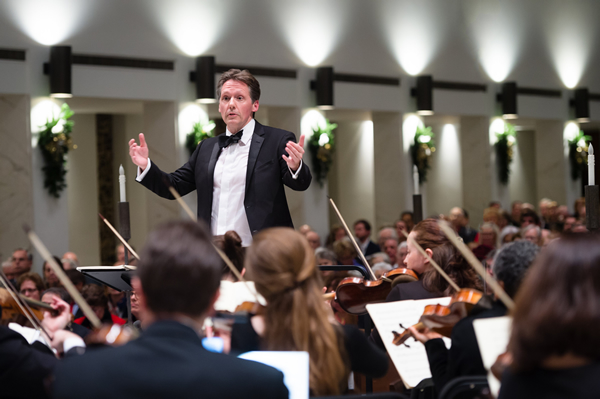
Dana Marsh says challenges in classical music often stem from an over-reliance on outdated concert practices. (Photo by David Betts; courtesy Metropolitan Photography)
a&e features
Margaret Cho returns to music with ‘Lucky Gift’
Collection of pop tunes includes tribute to non-binary people
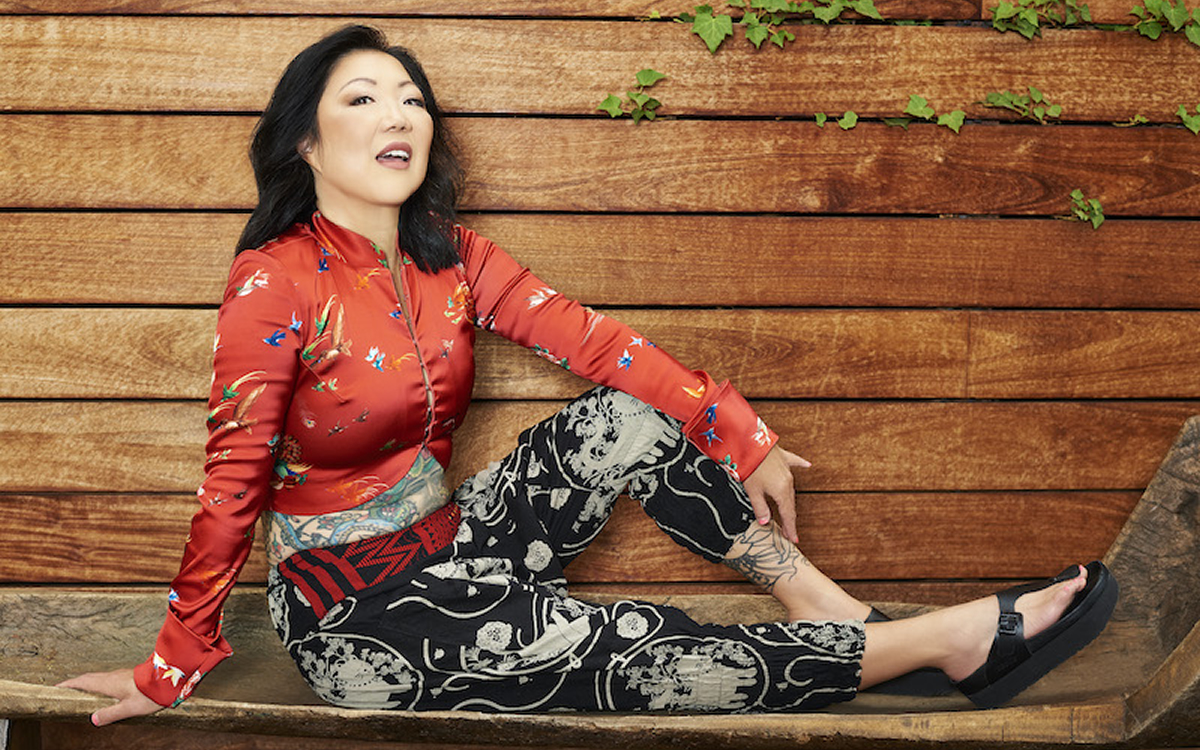
LOS ANGELES — It has been eight years since Margaret Cho released her Grammy-nominated “American Myth” album. She’s back to the music scene with her new album, “Lucky Gift,” an 11-track collection of anthems and pop tunes, a tribute to Robin Williams, and a shout-out to non-binary and gender non-conforming people.
The album captures the whirlwind that is Margaret and all of the different facets of her talents that have made her a powerhouse in entertainment and a leader in activism. In “Lucky Gift,” she’s getting her point across while having fun and getting glam.
We caught up with the activist and artist to chat about her music, our political climate, and the power of pop divas.
Known for her comedy, acting, and activism, she felt it was long overdue to get her music back out there too.
“I make music often. It’s a part of my daily life, it’s a big part of my social life, and it’s just something that I just love to do for my own relaxation and fun. I had enough for an album and I wanted to finally put them out. I was just really proud of how it all sounded together,” shares Cho.
“It’s a power pop record. For me, the songs are really meaningful. They’re all in their own way love songs. I’m a big fan of my own music (laughs), I really like the way that I sound and it’s really special to do. People know me as a comedian, and I have also made music for a long time, but it’s sort of a side project, and so it was time to put more out again.”
Her album also includes a touching tribute to Robin Williams. The entertainment community is finally more comfortable talking about mental health more openly. When relating mental health to her own life, Margaret, in true Margaret form, quickly turned the conversation to reflect today’s political climate.
“I have to maintain a level of peace and quiet and sometimes maybe get away from the news, although that’s tough because I am obsessed. I want to know what is happening. I’m really worried for our community, especially the trans community. I’m worried that this administration is trying to separate T and the Q from the LGBTQIA, and it’s really frightening.”
As an elder, Cho says she has to also remember that we’ve been through this before and it’s actually been much worse. As a community, we’ve been through a similar situation, and we were facing down a pandemic, which was killing us by the millions. So at least now we don’t have to fight AIDS as well as this onslaught of homophobia.
“We have fought for our rights, and we still have them, but we may not have them for long. So our mental health is very important to preserve now because we have to fight. The one thing to remember is they can’t do everything at once. They can’t take away trans rights, queer rights, gay rights, gay marriage, anti-depressants —ha — at the same time. So what we can do is just try to remain as calm as possible and fight as strongly as we can. But yeah, mental health is really vitally important right now.”
Margaret’s long history of queer activism stands for itself. She does not shy away from current issues, she uses her platforms to incite, educate, and question. For Margaret, there is no time off from being an activist. She was born into it, so to speak, being raised in San Francisco in the 1970s, her parents — the owners of a gay bookstore — and their employees followers of Harvey Milk.
“My activism is that I don’t have a choice. I’m going to be an activist no matter what. We’re doing this together, we’re going through this together. I will always be political. It’s just disheartening to see the ignorance of people and the lies that are being told that are believed.”
Margaret’s “Lucky Gift” comes at a perfect time when the queer community can come together over music. Cho looks at her album as a tool to empower an underdog community through the power of music.
“It’s the triumph of pop above all. We need to look to our pop divas above all. So now I’m more than ever, leaning on Madonna. [Thank God for Lady Gaga’s] “Abracadabra” because I think that things like that boost our community so much. When you can just get together and have a “brat summer,” that boosts our community so much in this togetherness, this explosion of excitement. I think Chappell Roan really ignited the pop capacity for healing. I love ‘Lucky Gift’ because it is my stepping into a pop diva moment. Pop divas should not be discounted for how important they are to our society and how much they lift us up.”
In addition to releasing her new album, Cho will continue to hit the road this year with her “Live and LIVID! Tour,” celebrating more than four decades of live stand-up shows. On this tour, she promises to rage about homophobia, sexism, racism, and the fight to stay alive. The five-time Grammy and Emmy-nominated performer is not holding back. According to her, the nation is not divided, just a little lost.
“We’re not divided. Everybody hates this. We all hate this. The fact is, the majority of the country does not want this. Unfortunately, a lot of people just didn’t vote because they just didn’t want to participate. That’s why we’re in the situation that we’re in. So to be on the road is a pleasure. And I rarely come against opposition. Every once in a while there’s something, but it’s something that we all handle. I think we all need a voice, a strong voice of reason to combat all of the hysteria.”
And her message to her fans?
“We’ll get through this. We’ll get through this with pop divas. ‘Abracadabra,’ learn the choreography, you do it sitting down. At least we have pop music, I have my hat in the ring here. But at least we have each other and we’re going to be OK. It’s going to be a ride, it’s going to be intense, but we can do this. We’ve been through this before and we are going to be fine.”
“Lucky Gift”is now available on all major streaming platforms.
a&e features
Meet the people giving a voice to LGBTQ truck drivers
‘Like therapy,’ finding solace in each other and the road
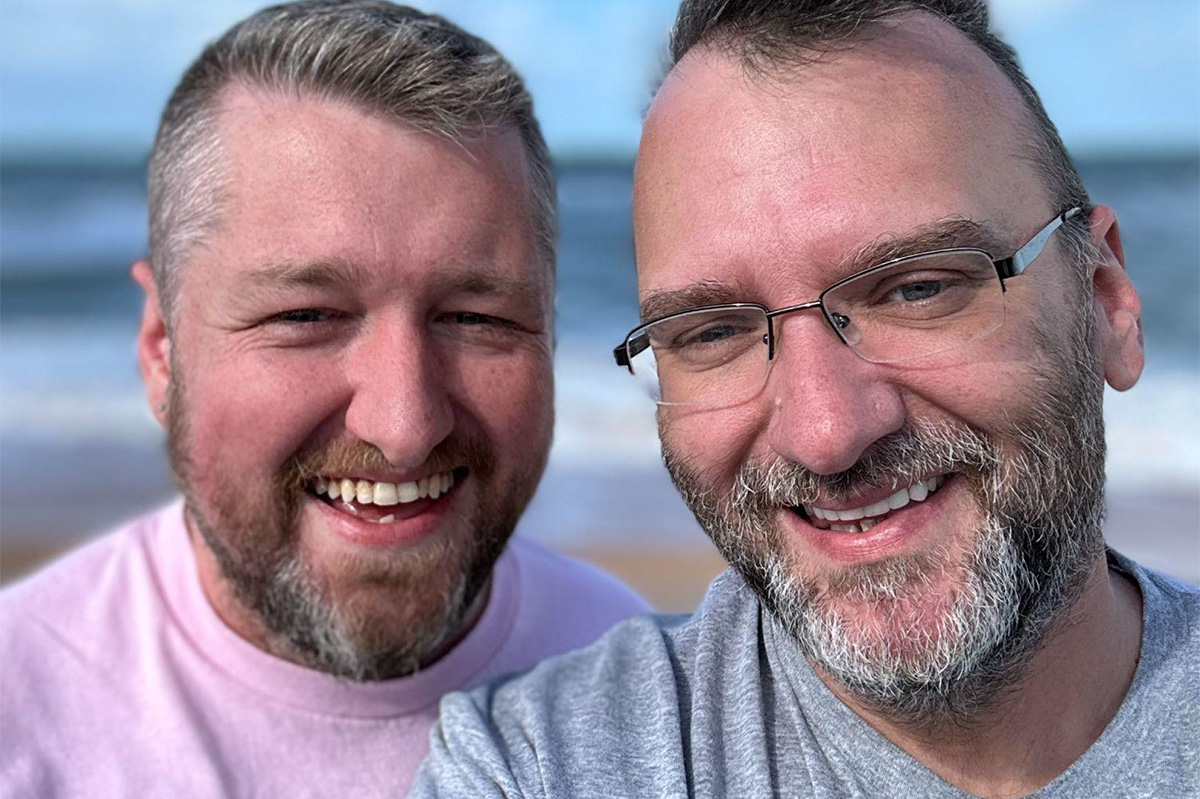
Before embarking on his weekly 2,000-mile trip as a truck driver, Derric Schmid sets up his smart TV and preps meals in bulk like ham and potatoes.
To some, long hours on the road away from family and friends sounds grueling. But for Schmid, it’s his way of life.
“I love the freedom,” Schmid said. “I get paid to go see the country. I’ve spent New Year’s Eve in New Orleans, I’ve spent it in St. Louis and this year I spent Christmas out in California exploring.”
Schmid is the vice president and senior diversity officer of LGBTQ+ Truck Driver Network (TDN), a nonprofit he runs with founder Bobby Coffey-Loy. TDN aims to foster inclusivity and safety in the truck driving industry by building a supportive network of allies and queer truckers.
The organization vets companies (Schmid says he calls 50-100 per week) to understand which are committed to creating safe spaces for drivers of all backgrounds. Schmid and Coffey-Loy also host the Big Gay Trucker Podcast, where they interview people who need advice or want to discuss taboo topics.
Coffey-Loy said meeting people from different walks of life, including trans people recovering from surgeries while on the road, inspired him to create TDN.
“It just opened me up to a whole group of people that just needed representation,” Coffey-Loy said. “There are groups out there on [social media] pages, but nobody actually took it as far as a nonprofit organization.”
Coffey-Loy drives with his partner of 17 years, Ricky, for a company called Luna Lines. Together they drive about 6,000 miles a week, taking turns sleeping or keeping one another company. On Monday, they typically start a load in Jacksonville and then drive to New Mexico, Chicago, Baltimore, Tennessee and end up back home in Palm Coast, Fla., by Friday. They even pay for all their gas and food while on the road.
Doing a weekly cross-country road trip in tight quarters with your partner can be trying, and Coffey-Loy will be the first to admit that: “Your partner is someone that knows how to push your buttons faster than anybody else,” he laughed.
But he also said starting truck driving together eight years ago is what made him and his husband closer. Before driving, he said it felt like life and jobs sometimes got in the way of their relationship. Going to trucking school together and being able to support each other on the road over the years has sparked a different kind of connection in their lives.
“We didn’t want to be apart from each other, so that’s what made trucking work for us,” he said.
For both Schmid and Coffey-Loy, truck driving runs in the family. Schmid, who’s been driving trucks for almost 24 years and with TDN for more than two, calls Jonestown, Pa., home –– a borough with a 2023 population of 1,645. He had three uncles and a grandfather who were truck drivers.
Coffey-Loy, born and raised in West Virginia, said his father and grandfather were truck drivers.
Continuing family tradition is respectable enough, but Coffey-Loy’s mission of creating a safe and supportive space for those in the industry was unique; it was difficult for his parents to accept his identity when he first came out.
Coffey-Loy’s parents passed away 11 months apart last year. He said they learned to grow to love him for who he was. When TDN started up, they became “mom and dad to everyone,” and even invited people with no familial structure to move in with them.
At get-togethers, his dad called everyone “sweetie” or “honey” to be respectful since he didn’t know how everyone identified.
“What they’ve taught me is, if they can change their mind and they can accept everybody, anybody can,” Coffey-Loy said. “I will cherish it forever. I miss them every day.”
And the impact of this lesson has been tried and true. TDN attended the Mid-America Trucking Show despite receiving death threats and facing extra security measures –– yet they ran through dozens of handouts before their station even opened. Another year, they handed out condoms to promote safe sex on the road and were met with backlash –– yet they went through a whole box on the first day.
The team behind TDN may be small –– about eight people –– but Schmid said their reach is wide. Thousands of people visit their social media pages from around the world and connect with each other, including a vocal German bus driver and a man from Africa trying to create more queer visibility in his area.
Coffey-Loy said many people contact him directly for support. There was a straight man who called who had trouble balancing his home life and truck driving hours and expressed suicidal thoughts. The man said he saw Coffey-Loy’s number and needed someone to talk to.
Moments like those are why Coffey-Loy emphasizes that the organization is there to support everyone, not solely the LGBTQ community. He recalled a bonfire gathering where people of different backgrounds and identities laughed and talked as friends.
“It’s why you do what you do,” Coffey-Loy said.
Although TDN has given many people a family away from home, it doesn’t make losing time with family and friends any easier. Coffey-Loy missed a family member’s funeral in West Virginia because he was in New Mexico and couldn’t abandon his load.
“He had already been buried before I could get back,” he said.
It’s a different way of life, but it’s not an impossible one. Schmid calls his mom and stepfather every morning and his mom again in the evenings. He gets on group calls with friends and TDN members. On weekends, Schmid sees some friends in person for dinners, and is able to visit with his family.
Truck driving may mean frequently saying goodbye to close people in his life, but it also opens the door to new connections around the country: “I got friends in every state,” Schmid said.
Although he’s constantly traveling, Coffey-Loy always feels at home. It’s those nights driving, with nothing but the roaring hum of the road filling the silence while his husband sleeps behind him, that fulfill him.
“Even though you miss so much of your everyday life, there’s something about trucking that is so freeing,” Coffey-Loy said. “The road can be so loud in your life, and it has a way to really sort out things. It’s like therapy for me.”
a&e features
Saldaña triumphs amid ‘Emilia Pérez’ collapse at Oscars
Karla Sofía Gascón loses top award to Mikey Madison after scandal

It’s no wonder the camera caught actress Michele Yeoh crying after watching queer singer Cynthia Erivo (nominated for best actress) and Ariana Grande (nominated for best supporting actress) perform one of the much-loved songs from “Wicked,” as they were simply magnificent.
Grande opened with Judy Garland’s “Somewhere Over the Rainbow,” and Erivo sang “Home” from “The Wiz.” That was one of the many bright spots in the 97th annual Academy Awards, which took place Sunday night at the Dolby Theatre in Hollywood.
While the duo sadly didn’t take away any awards, the magical film did — gay costume designer Paul Tazewell won the Oscar for Best Costume Design.
“This is absolutely astounding,” Tazewell enthused onstage, in his acceptance speech. “Thank you Academy for this very significant honor. I’m the first Black man to receive a costume design award for my work on ‘Wicked.’ I’m so proud of this.”
In the pressroom, Tazewell elaborated on his well deserved win.
“This is the pinnacle of my career. I’ve been designing costumes for over 35 years,” he said. “Much has been on Broadway and now into film, and the whole way through there was never a Black male designer that I saw that I could follow, that I could see as inspiration. And to realize that that’s actually me, it becomes a ‘Wizard of Oz’ moment, you know, it’s like no place like home. So to come back to the inspiration being inside of me was — is really remarkable.”
Tazewell said he achieved the award with the help of a lot of really amazing and talented costume artisans of all types and an amazing staff and assistants and crew.
“Because, you know, there’s no way for me to do it alone! And that also is my greatest joy — to be collaborating with other very talented artists, so I respect what that artistry is, and I share this with them because I value what their input is.”
The veteran costume designer knew the movie was going to be pretty spectacular, but he was “absolutely blown away,” because of their approach.
“We were working on two films at the same time. It wasn’t until I actually saw a pretty complete cut that I actually experienced the journey that we have created for audiences. And so, to experience that –I was beside myself. And it defined why I do costume design, why I am a costume designer.”
“Wicked” also won the Oscar for Best Production Design.
“Emilia Pérez,” Netflix’s mesmerizing Spanish language, trans crime musical, had a whopping 13 nominations, with first-time nominee Karla Sofia Gascón making history as the first trans woman to be nominated for best actress. This would have been the most nominated foreign film in the history of the Academy Awards.
Unfortunately, after the controversy surrounding her past tweets, the film only won two awards: for best supporting actress (Zoe Saldana) and best original song (“El Mal”).
While the U.S. is in an era of anti-trans political maneuvering, Sunday night’s broadcast included no mention of trans people.
In the pressroom, during an interview with “Emilia” composers Clément Ducol, Camille, and director Jacques Audiard, a journalist asked if anyone wanted to address what was happening.
Speaking in French via a translator, Audiard said, “Since I didn’t win Best Film or Best Director, I didn’t have the opportunity to speak, but had I had that opportunity, I would have spoken up.”
Saldaña, who starred as Rita, a lawyer who gets enmeshed with the trans cartel leader’s transition, was thrilled to win.
“I am floored by this honor. Thank you to the Academy for recognizing the quiet heroism and the power in a woman like Rita. And talking about powerful women, my fellow nominees, the love and community that you have offered me is a true gift, and I will pay it forward. Thank you so much Jacques Audiard, you are forever a beloved character in my life. Thank you for taking the interest, thank you for being so curious about these women to tell this story to my cast and my crew of ‘Emilia Pérez.’”
Saldaña’s nephew is trans; a few weeks ago, while winning the best supporting actress at the BAFTAs, she told journalists that she was dedicating the award to him.
“I’m dedicating all of these awards and the film ‘Emilia Pérez’ to my nephew, Eli. He is the reason — they are the reason — I signed up to do this film in the first place,” she said. “So as the proud aunt of a trans life, I will always stand with my community of trans people.”















